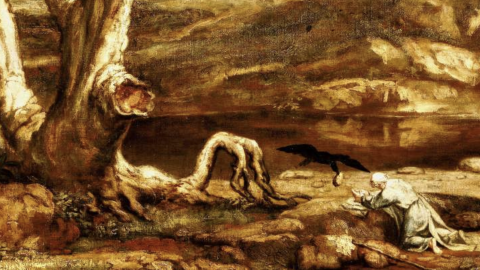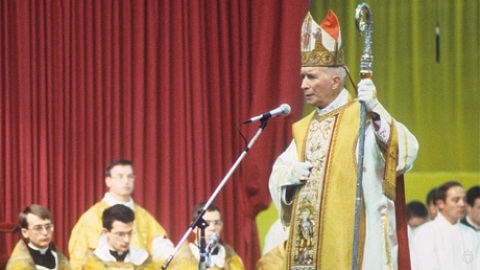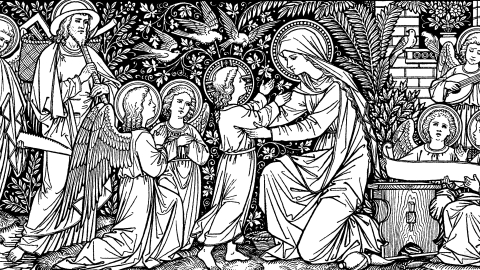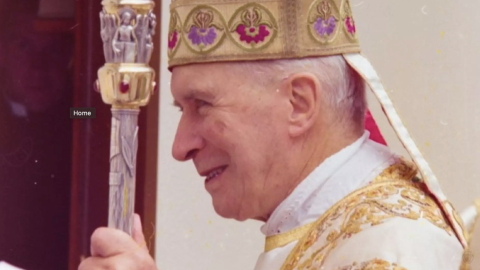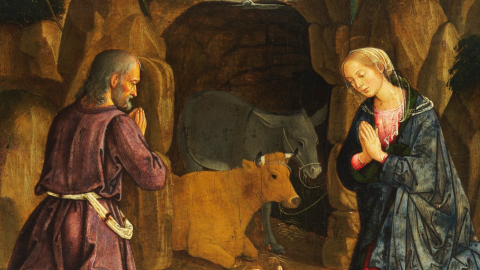Brief considerations on epidemic times by Father Jean-Michel Gleize

Catholic attitude in times of epidemic: The Dedication of Mgr de Blesunce during the plague of Marseille in 1720, by Nicolas André Monsiau (1818)
The question of the resumption of masses will probably be addressed in the near future. In the meantime, according to the directives of our superiors, services and masses at the usual times are not held in our chapels, either during the week or on Sundays. In doing so, are we obeying a just order from the State for the common good? Or is it an abuse of temporal power that the Church must tolerate out of prudent realism? We have asked Father Jean-Michel Gleize, professor of Ecclesiology at the seminary of Ecône, for his clarification.
“Since, then, no one is allowed to be remiss in the service due to God, and since the chief duty of all men is to cling to religion in both its reaching and practice-not such religion as they may have a preference for, but the religion which God enjoins, and which certain and most clear marks show to be the only one true religion -it is a public crime to act as though there were no God.” (note 1).
1. These strong words of Pope Leo XIII are not the expression of an outdated vision. For in them the Vicar of Christ points to the very principle of the Christian social order, an order which is necessary because it is an expression of divine wisdom. Cardinal Billot gave its theological justification in the second part of his Treatise on the Church (note 2).
2. This order finds its deep root in the very nature of man and in his gratuitous elevation to a supernatural order. Man's external goods ( wealth) are ordered to his bodily well-being, and man's bodily well-being is ordered to his natural spiritual well-being, that is to say, to the natural good of his soul, and this natural good of the soul is itself in some way ordered to the supernatural final end, to man's supernatural union with God, for which the Church is responsible; it is so to the exact extent that the natural good of the soul is the necessary, though not sufficient, condition of the supernatural good, since grace presupposes nature. This hierarchy of goods entails the hierarchy of powers to which it is incumbent to procure these goods (note 3).
The Church has to ensure the exercise of the worship due to God
3. The power of the State has (among other things) the purpose to preserve public health, in its own order (which is the good of the body) and to neutralise for this purpose the harmful effects of a contagious disease. The power of the Church has the purpose in its own order to ensure the exercise of the worship due to God and to determine for this purpose by means of precepts the concrete conditions of Sunday sanctification. In order to be distinct, each in its own order, the power of the state and the power of the church must not be separated (note 4), for the good which falls to the state is not in fact an ultimate end; it is itself ordained at the end of the supernatural order.
St. Thomas explains this very clearly in De regimine, Book I, Chapter XV: "It is to the Pope that the care of the ultimate end is entrusted, and to him must be submitted those whom the care of the intermediate ends beholds, and it is by his orders that they must be directed. » (n° 819). The Pope thus exercises an "architectural" power vis-à-vis the Heads of State, and this expression means that the Pope has responsibility for the ultimate end, according to which the Heads of State are obliged to organize the entire government of society.
4. Health, which is one of the principal aspects of man's bodily well-being, has something to do with sanctity, for it is ordered in some way to the exercise of worship and the sanctification of Sunday. Indeed, even if it is not enough to be healthy to be a saint, and even if one can be a saint without being healthy, ordinarily, in order to be able to go to Mass on Sundays, to be healthy is one of the conditions required. The role of the State is therefore to preserve public health (and to neutralize an epidemic) in order to achieve the best condition for the exercise of worship, for which the Church is responsible, and to make ordinarily possible holiness.
Pope Leo XIII says that "in a society of men, freedom worthy of the name consists in the fact that, with the help of civil laws, we can more easily live according to the prescriptions of the eternal law" (note 5). The State is therefore in this instance, as elsewhere, dependent on the Church and subordinate to Her, to the exact extent that its role is to place the temporal good for which it is responsible at the service of the eternal good, for which the Church is responsible. "The temporal", says Billot, "must see to it that nothing prevents the realization of the spiritual and establish the conditions of grace under which it can be freely obtained". And he adds that the temporal end "must put no obstacle in the way of the spiritual end, and if it were to oppose it, it should favor the spiritual, even at the cost of its own prejudice" (note 6).
These words are astonishing in the eyes of simple reason, but true words in the eyes of reason enlightened by faith. For "it is better to enter eternal life with one eye than to be cast into the fire of hell with two eyes" (note 7).
For the State, to prohibit or limit worship is an abuse of power
5. Consequently, to prohibit or limit worship in order to neutralize an epidemic would be, on the part of the power of the State, not only illegitimate (by abuse of its temporal power, which cannot as such relate to the exercise of worship) but even absurd, since the ultimate purpose of neutralizing the epidemic must be to promote the exercise of worship. Unless we assume the radical inversion of ends and substitute disorder for order: instead of health (with the neutralization of the epidemic) being ordered to the exercise of worship, it would be the exercise of worship (with its restriction and prohibition) that would be ordered to health.
And this is unfortunately what we see in the present circumstances, and which justifies the recent statement of Bishop Schneider: "Men of the Church give more importance to the mortal body than to the immortal soul of men" (note 8). This can be explained by the radical inversion introduced by the Second Vatican Council: it is no longer the State which is subordinate to the Church and to the service of the Church, but the Church which has become dependent on the States.

1918: The Red Cross evacuates victims of the Spanish flu
It is not for the state to forbid or restrict the worship in the name of health; it is for the church to decide the conditions of worship in the light of circumstances...
6. It may happen that, from the point of view of contingency, which is that of concrete circumstances, it may not be possible to provide sufficient public health and to neutralize the contagion of a disease, so as to make it possible to practise worship in the ordinary way. It is then up to the ecclesiastical authority - and to it alone - to determine the particular form of the exercise of worship required by the circumstances, and to make it possible by relying on the secular arm. The State could thus, for example, put at the disposal of the Church sufficiently large spaces where the faithful could attend Mass while remaining confined to their vehicles.
In the worst case, the Church could dispense its faithful from attending Mass and there again rely on the resources, technical and financial, which the State would place at its disposal to broadcast massively in homes television broadcasts of the celebration of Mass. Situations and solutions may be very diverse; but in any case the Church has the power to decide the conditions under which the total order is to be established, the total order according to which the exercise of worship is a higher good to which the good of public health is to be ordered. It is not for the state to forbid or restrict the worship in the name of health; it is for the church to decide the conditions of worship in the light of circumstances, seeking, as it has the duty and power to do, the support and assistance of temporal power.
7. This necessary and normal hierarchy of powers was still largely in effect in the Catholic cantons of Switzerland at the beginning of the 20th century. Even in the wake of the great upheavals that had shaken the Christian social order throughout Europe, the political authorities in the Valais, for example, had only limited power in the churches and could only intervene diplomatically to recommend to the church authorities that the health measures necessitated by the Spanish flu epidemic be respected. "It is therefore not surprising to find in the decree of the Council of State of 25 October 1918: "The ecclesiastical authority will prescribe the necessary hygiene measures with regard to the churches and the celebration of divine services".
In doing so, the clergy had the choice of the measures it wished to apply without any question of financial or legal reprisals. As a result, the various letters addressed to the parishes are more like a succession of recommendations seeking to protect sensitivities rather than a firm political decision. A second circular concerning more specifically burials stipulates that the coffin should be taken directly to the cemetery for burial and that the burial mass should be celebrated only in the presence of the immediate family and after burial. Once again, the letter ends with a diplomatic note: "We hope that you will understand the need for these measures designed to remove the danger of contamination as far as possible and that you will comply with my instructions", which is quite different from the letters addressed to the various trades, which end instead with a reminder of the possible sanctions if the measures are not followed.
It is interesting to note that this same circular, dated July 20, 1918, was found in the Episcopal archives of Sion, but a small handwritten footnote was added to it: "We would like to receive on this subject directions from the Vicar". Political authority is not universally authoritative ... "(note 9). When, one hundred years later, the apostate States of the twenty-first century unilaterally decide to prohibit or restrict the exercise of worship, in the name of health, the Catholic faithful of course react under the guidance of their pastors not as fanatical reactionaries, but as prudent and realistic people, and they tolerate (note 10) or patiently endure unjust decisions contrary to supernatural prudence. But under no circumstances can they be held to a true act of the virtue of obedience to what remains in reality an abuse of power.
"What does it profit man if he gains the whole universe if he loses his soul?"
8. All of this can be explained by a final cause. From this point of view, the power of the Church is to the heads of state like the power of a caretaker to a care assistant. The assistant carer carries out the dosage of medicines as much as is required for the health of the body, which the caretaker is in charge of. Likewise, the head of state must ensure the good order of society as much as is required for the salvation of souls, for which the Church is responsible. For man should seek health and wealth only in so far as it is required - as St. Ignatius says - to save his soul: "What does it profit man if he gains the whole universe if he loses his soul? (Mt, XVI, 26). What use is it to man to win the victory over the epidemic if he neglects the sanctification of his soul, losing the habit of going to Mass on Sundays? The ancient liturgy of the Church provided for a Mass in times of epidemic and the rubrics said that such Masses should be celebrated "with great participation of the people"....
Father Jean-Michel Gleize
Notes:
(1) Leo XIII, Encyclical Immortale Dei of November 1, 1885, ASS, vol. XVIII (1885), pp. 163-164.
(2) Louis Billot, L'Eglise. III - L'Eglise et l'Etat, Courrier de Rome, 2011.
(3) Louis Billot, op. cit. no. 1183.
(4) The separation of Church and State was condemned by Pope Saint Pius X in the Encyclical Vehementer nos. of 11 February 1906.
(5) Leo XIII, Encyclical Libertas of 20 June 1888, ASS, vol. XX (1887), p. 598.
(6) Louis Billot, op. cit. no. 1182.
(7) Mt, XVIII, 9.
(8) Bishop Athanasius Schneider, "Interview with Diane Montagna" published on The Remnant and translated on Jeanne Smits' Blog, page of 28 March 2020.
(9) Laura Marino, La Grippe espagnole en Valais (1918-1919), thesis presented at the Faculty of Biology and Medicine of the University of Lausanne for the degree of Doctor of Medicine, 2014, pp. 182-183. Thesis on deposit on the University of Lausanne archives site, http://serval.unil.ch under the reference BIB_860E861187545.
(10) This explains the appearance of the concordat regime, with the definition of certain so-called "mixed" subjects. Cf. Billot, n° 1247 et sq.
Sources : La Porte Latine du 19 avril 2020
